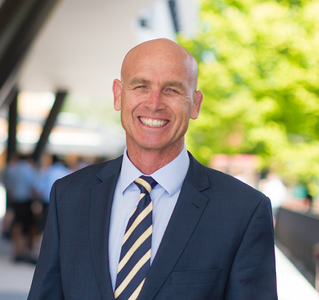On Thursday 4 May, the College is hosting an Evening of Dialogue featuring Dr Hugh Mackay, Lara Kirk, Michael McGirr, and Br David Hall. Such an event invites reflection on the purpose of providing opportunities for dialogue in our Marist Catholic school and the wider Catholic Church. At the current time Pope Francis is actively encouraging a process of synodality and through the Plenary Council the Australian Catholic Church has experienced a deep and extensive process of dialogue. As a College we have set a goal of being a community that engages in Spirit led dialogue. Simply understood, this is listening and speaking with God and with each other.
The first consideration is that society and communities work through dialogue. It is how people relate. Individuals and groups of people engage with each other through the respectful sharing of ideas and insights; through speaking and deep listening. This is what First Nations people identify as dadirri.
A second way to look at the importance of dialogue is by recognising that it is one way that God reaches out to humanity. The First Testament contains examples of dialogue between the Chosen People and God. Sometimes directly and at other times through the prophets. Some key examples are Adam and Eve, Abraham, and Moses. The whole of scripture can be viewed as dialogue. Through these words, God speaks, and we are invited to respond.
A particularly apt example from the New Testament is the account of the Annunciation in Luke. This is not a one-way directive from God to Mary through Gabriel. It is a respectful conversation. The angel speaks, Mary listens, challenges the message, a conversation ensues and ultimately, Mary accepts the invitation to become the Mother of God.
The Gospels contain multiple accounts of Jesus in dialogue with others. This Sunday’s Gospel, the Road to Emmaus, is an extraordinarily rich and powerful record of dialogue between the risen Christ and a couple of disciples - the outcome of which is new understanding.
The imperative for Christians to engage in dialogue is explicit in the Vatican II document, Lumen Gentium. Here the Church is identified firstly as mystery, then as the pilgrim people of God and only in the third instance as a structure. Christians are called upon to dialogue with members of other faiths and the wider world. This is a process of mission.
Christians are also called upon to dialogue with each other. Again, this is a process of mission but also a means through which we can access the sensus fidei, the sense of faith. A way in which the community can discern the promptings of the Holy Spirit.
Of course, there is a risk in engaging in dialogue with others. If the only people we converse with are those of like mind, then we miss an opportunity to hear from the other. As St Benedict reminds us, the stranger is to be welcomed as a guest and given hospitality. He instructed his monks to receive all guests as Christ, “for he will say, ‘I was a stranger and you welcomed me’” (Rule of Benedict, 53:1; Matthew 25:35). The 'other' may be Christ in our midst and through prayer and conversation we may discern new insights. Another risk is that we might change as a consequence of listening to others, not in an ad hoc way but rather through the exercise of listening, praying and conversing.
But there is an even greater risk inherent in avoiding dialogue - we may not receive or hear the promptings of the Holy Spirit.
You are all invited to participate in the Evening of Dialogue, Thursday 4 May, at the College. To see more details and to register, please click here.
Peter Hawes
Assistant Head of School – Mission and Identity



















